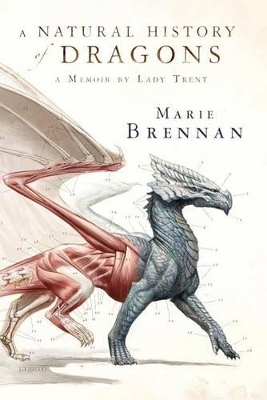Typically I am not a huge fan of first person narration, but A Natural History of Dragons creates such an authentic picture of Lady Trent that I couldn’t imagine it depicted any other way. The novel is written as a fictional memoir, with Lady Trent reliving the past adventures of her youth, when she is known as simply Isabella Camherst. As a dragon lover, I was immediately able to relate to Lady Trent’s lifelong obsession to dragons and loved how she struggled to be a proper lady while still pursuing her own passion with the creatures.
"I attempted to restrain my enthusiasm; learning is an admirable thing, in women as well as men, but only when it is of the right kind. (That is, of course, society’s opinion; not my own. I am glad to say it has changed somewhat since my day.)""
I really enjoyed the time period of the novel as well. It takes place in an era where women wear petticoats, have ladies-in-waiting, and a lot of societal expectations. Though it reminded me of the Victorian period, the novel is set in a fictional universe, where not only do dragons exist, but not much is known about them at present. Throughout the novel, I struggled to progress as the story was framed as a scientific pursuit of dragons, and not a fantasy, adventure novel, so to speak. It could be quite dry, and parts of the novel that involved executing a dragon, were repugnant to me, a dragon lover. Though I did really enjoy the beautiful illustrations that resulted from their scientific research.
“In which the memoirist forms a youthful obsession with dragons, and engineers an opportunity to pursue that obsession.”
Another thing that I really struggled with in the novel, besides the scientific nature of it, was the fact that Isabella’s husband, Jacob Camherst, was nothing more than a willing plot device. By marrying him, she has access to his library and is able to join on an expedition to study dragons as an “artist”--both things quite scandalous for her sex and for her time period. Though there is some affection between the husband and wife, it is not anything overly romantic and Isabella does not waste much time talking about him. And as Isabella frequently reigns herself in for the sake of her husband and his reputation, I was not overly surprised when he was killed off at the end of the novel. Now as a widow, she has unrestricted access to his wealth and more freedom, as only her reputation will be harmed by her scientific pursuits. So basically her husband’s only role in the novel was to get her where she wanted to go and then die. Her miscarriage is similarly glossed over and practically irrelevant to her character development.
"One benefit of being an old woman now, and moreover one who has been called a 'national treasure,' is that there are very few who can tell me what I may and may not write."
Though interesting to see a man as purely a plot device, it didn’t really do anything to help me sympathize with Isabella. Furthermore, her high-class breeding is even less endearing at times/ She is condescending to the local villagers on her draconic expedition and outright rude to a self-made man of lower birth. Ultimately, I found myself getting tired of her voice around halfway through the book--quite a feat since I related to her dragon passion so much in the beginning of the novel. I liked Lady Trent much better when she was a child, devouring books and wishing she could do the same things boys did. As a young adult, and both an old woman writing her memoirs, Isabella is overconfident and unlikable.
It doesn’t help matters that Lady Trent herself states multiple times that she was very naive during the events of this memoir and that her early traveling works should not even be read. I can only imagine how bad those works were, as I was tired of reading the legitimate memoir. I was also dismayed the A Natural History of Dragons had more to do with Isabella’s constant poor decisions, illegal smuggling, murder, and other conspiracies, than actual dragons.
By far my favorite part of the A Natural History of Dragons concerned the world building before Lady Trent’s expedition and also the parts of her expedition that surrounded the local lore of the villagers. Much of it surrounds Zhagrit Mat, a king with the dangerous desire to become a dragon. I was similarly intrigued by the Draconean ruins that Isabella visited, and wished the novel had spent more time on these type of things over smuggling and conspiracies.
"You’re dragon-mad, Mrs. Camherst, and sooner or later you’ll be keen to have another chance at it. When that day comes, let me know.”
Though being quite dragon-mad myself, I will not be rushing out to purchase another novel in The Lady Trent Memoirs. I would be interested to see if future novels deal more with dragons and less with other subjects, but I don’t feel any urgency to read predecessors to A Natural History of Dragons. While I enjoyed the novel’s creative methods of narration and storytelling, there just weren't enough actual dragons or a narrator likable to keep me hooked.
Book Review Policy
Connect with Me:
